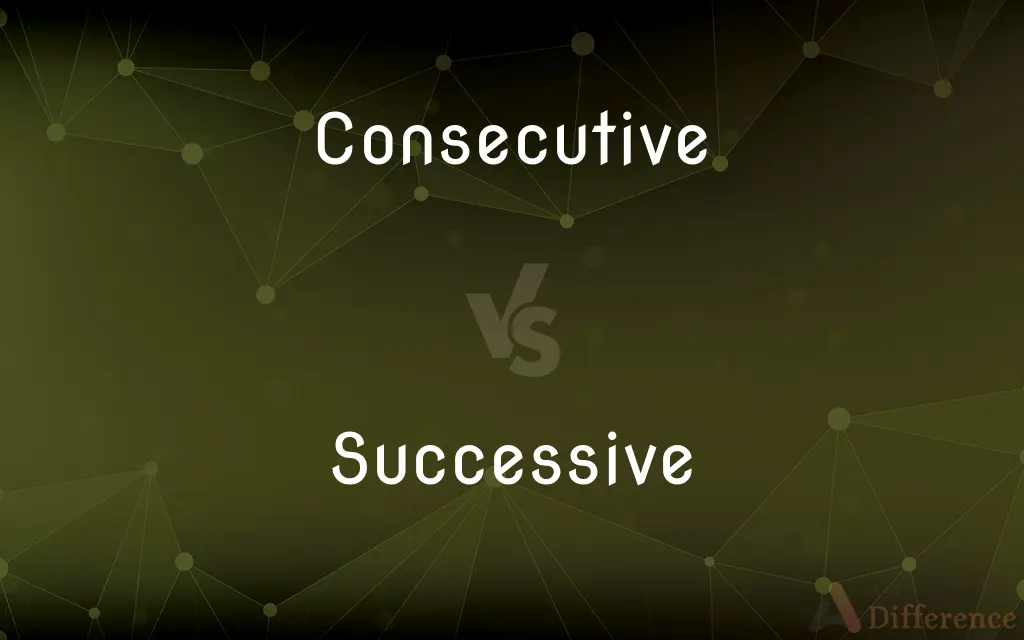Consecutive vs. Successive — What's the Difference?
Consecutive refers to things following directly one after another without interruption, while successive implies a sequence but allows for intervals.

Difference Between Consecutive and Successive
Table of Contents
ADVERTISEMENT
Key Differences
Consecutive events or numbers follow each other without interruption, highlighting an immediate sequence. Whereas, successive occurrences can be part of a series that happens one after another, but not necessarily without a break between them.
Consecutive is often used in contexts where there's a strict, uninterrupted continuation, such as days of the week or numbers in a series. On the other hand, successive might imply a repetition in occurrences or positions over time, potentially with intervals or breaks, such as presidents or annual events.
When talking about consecutive numbers, they are directly adjacent to each other, like 1, 2, 3. Successive, however, can refer to events or items that follow one another but not immediately, allowing for possible gaps or variations in sequence.
In sports, a team might win three consecutive games, meaning they win three games in a row without losing any in between. Successive wins, while similar, could be interpreted to allow for a broader understanding, possibly including wins across seasons or years.
Consecutive is best used when emphasizing a seamless, direct succession in a series or order. Successive, while similar, is more flexible, accommodating sequences that occur one after another, but not necessarily without interruption.
ADVERTISEMENT
Comparison Chart
Definition
Following one another without interruption
Following in order, but not necessarily without interruption
Usage Context
Strictly adjacent numbers or days
Events, titles, or positions over time
Sequence
Direct and immediate
May have intervals or gaps
Example 1
Consecutive days of the week
Successive generations
Example 2
Consecutive numbers (1, 2, 3)
Successive presidents
Compare with Definitions
Consecutive
Following continuously without any breaks.
She attended the conference for three consecutive days.
Successive
Occurring one after another in a sequence.
She was elected for two successive terms as mayor.
Consecutive
Events happening one right after the other.
The team celebrated their fourth consecutive victory.
Successive
Positions or titles held by individuals in turn.
Three successive CEOs have expanded the company.
Consecutive
Actions or processes that proceed without pause.
The movie series was released on three consecutive Fridays.
Successive
Series of actions or events that follow one another.
The artist unveiled his creations in successive exhibitions.
Consecutive
Numbers or items arranged without gaps in a sequence.
He won the chess tournament in five consecutive games.
Successive
Events or items following each other, allowing for intervals.
The annual festivals were held in successive years.
Consecutive
Periods of time following each other directly.
We experienced rainfall for seven consecutive hours.
Successive
Achievements or occurrences happening in order, over time.
The athlete won medals in successive Olympic games.
Consecutive
Following each other continuously
Five consecutive months of serious decline
Successive
Following in uninterrupted order; consecutive
On three successive days.
Consecutive
Expressing consequence or result
A consecutive clause
Successive
Of, characterized by, or involving succession
The government successive to the fallen monarchy.
Consecutive
Denoting intervals of the same kind (especially fifths or octaves) occurring in succession between two parts or voices.
Successive
Coming one after the other in a series.
They had won the title for five successive years.
Consecutive
Following one after another without interruption; successive
Was absent on three consecutive days.
Won five consecutive games on the road.
Successive
Of, or relating to a succession; hereditary.
A successive title; a successive empire
Consecutive
Marked by logical sequence.
Successive
(grammar) Of or relating to the grammatical aspect which presupposes the completion of a secondary action as a premise for the primary action of the statement.
Consecutive
(Grammar) Expressing consequence or result
A consecutive clause.
Successive
Following in order or in uninterrupted course; coming after without interruption or interval; following one after another in a line or series; consecutive; as, the successive revolution of years; the successive kings of Egypt; successive strokes of a hammer.
Send the successive ills through ages down.
Consecutive
Following, in succession, without interruption
Successive
Having or giving the right of succeeding to an inheritance; inherited by succession; hereditary; as, a successive title; a successive empire.
Consecutive
Having some logical sequence
Successive
In regular succession without gaps;
Serial concerts
Consecutive
A sequence of notes or chords that results from repeated shifts in pitch of the same interval.
Consecutive
A linguistic form that implies or describes an event that follows temporally from another.
Consecutive
Consecutive interpretation.
Consecutive
Following in a train; succeeding one another in a regular order; successive; uninterrupted in course or succession; with no interval or break; as, fifty consecutive years.
Consecutive
Following as a consequence or result; actually or logically dependent; consequential; succeeding.
The actions of a man consecutive to volition.
Consecutive
Having similarity of sequence; - said of certain parallel progressions of two parts in a piece of harmony; as, consecutive fifths, or consecutive octaves, which are forbidden.
Consecutive
In regular succession without gaps;
Serial concerts
Consecutive
Successive (without a break);
Sick for five straight days
Consecutive
One after the other;
Back-to-back home runs
Consecutive
In a consecutive manner;
We numbered the papers consecutively
Common Curiosities
What does consecutive mean?
Consecutive refers to things or events that follow one another continuously without any breaks.
How does sports use the term consecutive?
In sports, consecutive often refers to uninterrupted wins or occurrences, such as games won in a row without any losses in between.
How are successive events different from consecutive ones?
Successive events follow one after another but can have intervals or breaks between them, unlike consecutive events that occur without interruption.
Can numbers be considered successive?
Yes, numbers can be considered successive if they follow one after the other in a sequence, though consecutive numbers specifically follow without any gaps.
Is it possible for days to be both consecutive and successive?
Days can be both consecutive and successive if they follow one another without any breaks, meeting the criteria for both definitions.
Are consecutive numbers always integers?
Yes, consecutive numbers are typically integers that follow one another without any gaps, like 1, 2, 3.
Can someone hold a position for successive terms?
Yes, an individual can hold a position for successive terms if they are elected or appointed to it multiple times in a row.
What distinguishes successive generations?
Successive generations refer to family members born one after another, often implying a sequence over time rather than immediate succession.
Are all consecutive sequences also successive?
Yes, all consecutive sequences are also successive since they follow one after another, but not all successive sequences are consecutive.
How can a series of events be both consecutive and successive?
A series of events can be both if they occur one right after the other without any gaps, fitting both definitions.
What is an example of consecutive days?
An example of consecutive days would be Monday, Tuesday, and Wednesday of the same week.
Can successive events occur across different contexts?
Yes, successive events can occur across different contexts and times, such as annual events or leadership positions.
What makes a sequence consecutive?
A sequence is considered consecutive if each item or event follows directly after the previous one without any breaks.
Can championships be won on a consecutive basis?
Yes, championships can be won consecutively if a team or individual wins them in successive years without interruption.
Is there a difference in how consecutive and successive are used in legal contexts?
In legal contexts, consecutive often refers to sentences served back to back without overlap, while successive might not be as commonly used with a specific legal meaning, focusing more on sequence rather than uninterrupted order.
Share Your Discovery

Previous Comparison
Bugbear vs. Hobgoblin
Next Comparison
Exceptional vs. Excellent














































